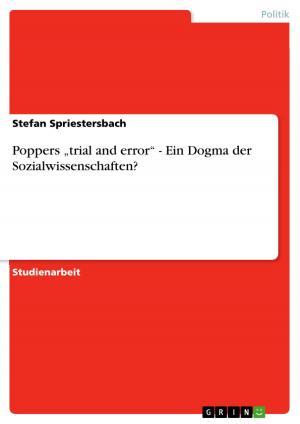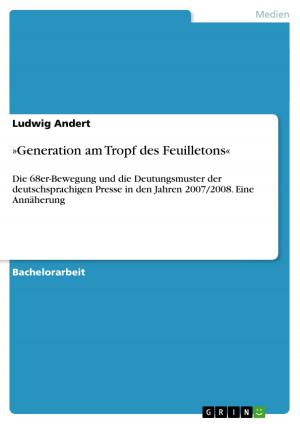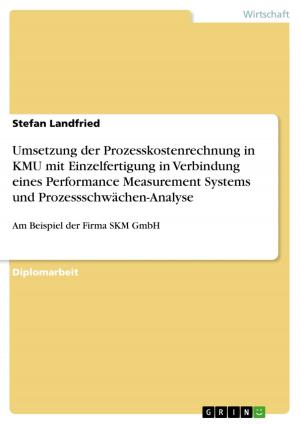Opportunities and Risks of the Proposed Referendum on United Kingdom's Membership in the EU (BREXIT)
Nonfiction, Social & Cultural Studies, Political Science| Author: | Philipp Freund | ISBN: | 9783668125063 |
| Publisher: | GRIN Verlag | Publication: | January 14, 2016 |
| Imprint: | GRIN Verlag | Language: | English |
| Author: | Philipp Freund |
| ISBN: | 9783668125063 |
| Publisher: | GRIN Verlag |
| Publication: | January 14, 2016 |
| Imprint: | GRIN Verlag |
| Language: | English |
Seminar paper from the year 2015 in the subject Politics - International Politics - Topic: European Union, grade: 1,0, University of Würzburg (Institut für Politik und Soziologie), course: UK Politics and the 2015 General Election, language: English, abstract: Our current political situation couldn't be more interesting. Besides global problems on terrorism, global warming and wars all around the world, there is one major topic in our news: it's the EU with its internal problems from financing Greece to internal stability. The last mentioned point will be subject of that paper, because Britain is deeply divided about the proposed referendum on United Kingdom's Membership in the European Union, respectively its opportunities and risks. During the last election in the UK, Prime Minister David Cameron took the referendum into the manifesto of his Conservative Party because of the annual debates about costs and benefits from the EU and after winning the election he now has to stand up for it. The back then started campaign »Let Britain decide« will now reveal, whether or not the Brits want to stay or not. t is not unreasonable to think about Britain leaving the EU as, for example, Anthony Forster lists the historically settled problems between Europe and Great Britain in his book-summary like it is inevitable for the UK to leave. And talking about the legality of that referendum is therefore not an option, because Article 50 TEU (Treaties of the European Union) settles the possibility of a voluntary resignation (cf. Streinz et al. 2008: 38-39). The main part of the seminar paper is going to start, after introducing the topic in the initiation, with an analytically and descriptively chapter of analysing the pros and cons of leaving the EU. The first section of the main part is therefore divided in two parts, the opportunities and the risks. In the course of doing this, the perspective is clearly aligned to the UK itself, so that one should be able to decide, whether or not it will be good for the British people to vote yes or no and which decision they should take. Possible consequences for the EU are completely hidden, because it doesn't matter for the Brits, who take part in this referendum. In addition to that there will be an analytic part of discussing the meaning of the mentioned opportunities and risks as section two of the main part. Subsequently, in an overview chapter, the advantages and disadvantages are going to be compared to each other to be able to qualify both of them. The final conclusion will take place in Chapter 5, in which the paper will be finished with an outlook and an analysis which option to take.
Philipp Freund, geboren am 27.04.90 in Bad Mergentheim, studierte Staats- und Sozialwissenschaften an der Universität der Bundeswehr in München. Hieran angeschlossen wird seit 2014 ein Gymnasiallehramtsstudium in der Kombination Englisch, Sozialkunde und Geschichte an der Julius-Maximilians-Universität in Würzburg, wo er u.a. auch als Tutor tätig ist.
Seminar paper from the year 2015 in the subject Politics - International Politics - Topic: European Union, grade: 1,0, University of Würzburg (Institut für Politik und Soziologie), course: UK Politics and the 2015 General Election, language: English, abstract: Our current political situation couldn't be more interesting. Besides global problems on terrorism, global warming and wars all around the world, there is one major topic in our news: it's the EU with its internal problems from financing Greece to internal stability. The last mentioned point will be subject of that paper, because Britain is deeply divided about the proposed referendum on United Kingdom's Membership in the European Union, respectively its opportunities and risks. During the last election in the UK, Prime Minister David Cameron took the referendum into the manifesto of his Conservative Party because of the annual debates about costs and benefits from the EU and after winning the election he now has to stand up for it. The back then started campaign »Let Britain decide« will now reveal, whether or not the Brits want to stay or not. t is not unreasonable to think about Britain leaving the EU as, for example, Anthony Forster lists the historically settled problems between Europe and Great Britain in his book-summary like it is inevitable for the UK to leave. And talking about the legality of that referendum is therefore not an option, because Article 50 TEU (Treaties of the European Union) settles the possibility of a voluntary resignation (cf. Streinz et al. 2008: 38-39). The main part of the seminar paper is going to start, after introducing the topic in the initiation, with an analytically and descriptively chapter of analysing the pros and cons of leaving the EU. The first section of the main part is therefore divided in two parts, the opportunities and the risks. In the course of doing this, the perspective is clearly aligned to the UK itself, so that one should be able to decide, whether or not it will be good for the British people to vote yes or no and which decision they should take. Possible consequences for the EU are completely hidden, because it doesn't matter for the Brits, who take part in this referendum. In addition to that there will be an analytic part of discussing the meaning of the mentioned opportunities and risks as section two of the main part. Subsequently, in an overview chapter, the advantages and disadvantages are going to be compared to each other to be able to qualify both of them. The final conclusion will take place in Chapter 5, in which the paper will be finished with an outlook and an analysis which option to take.
Philipp Freund, geboren am 27.04.90 in Bad Mergentheim, studierte Staats- und Sozialwissenschaften an der Universität der Bundeswehr in München. Hieran angeschlossen wird seit 2014 ein Gymnasiallehramtsstudium in der Kombination Englisch, Sozialkunde und Geschichte an der Julius-Maximilians-Universität in Würzburg, wo er u.a. auch als Tutor tätig ist.















